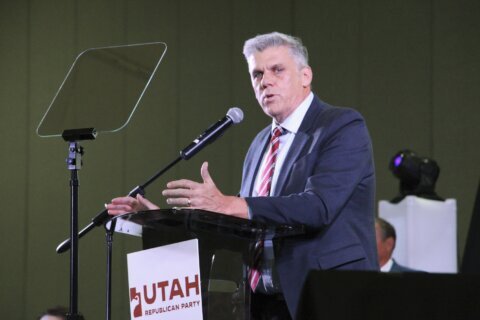Excerpts from recent editorials in the United States and abroad:
Feb. 22
The Washington Post on the Biden impeachment inquiry
Until this month, House Republicans referred to information provided by a “highly credible” FBI informant as the core of their case to impeach President Biden. This week, they quietly deleted any mention of that source from official documents. This one small move speaks volumes about an ill-founded GOP crusade that seems finally to be reaching an embarrassing denouement.
Special counsel David Weiss — the man in charge of the Justice Department’s criminal case against Hunter Biden — last week filed charges against Alexander Smirnov. The 43-year-old U.S.-Israeli citizen, prosecutors say, lied to federal investigators about the Biden family’s business dealings. These lies, crucially, included claims that the president and his son each sought $5 million bribes from Ukrainian energy company Burisma when Mr. Biden was vice president, in exchange for protecting the firm from scrutiny by Ukraine’s national authorities. Now, Mr. Smirnov has also disclosed that “officials associated with Russian intelligence” fed him his information.
Of course, there’s reason for skepticism about that latest explosive allegation from this supplier of apparently bogus bombshells. The memo released on Tuesday portrays Mr. Smirnov as a con man hawking “an amalgam of otherwise unremarkable business meetings and contacts,” none of which occurred during the time period he purported, as proof of corruption. He apparently lied about his wealth, his profession and more. Prosecutors even refer to “new lies” Mr. Smirnov is “actively peddling … that could impact U.S. elections,” involving suggestions that Moscow “may use as ‘kompromat’” information taken from intercepted phone calls of Hunter Biden in a foreign hotel.
Might Mr. Smirnov also be lying about Russian officials providing him with dirt on the president? Absolutely. But that is the point. Either Mr. Smirnov is an asset in a current Kremlin plot to spread disinformation about the president, an eerie echo of 2016’s election interference, or he is dissembling about that, too. Either way, congressional Republicans have staked their impeachment inquiry on the words of a fabulist.
This turn of events is devastating for the Republican effort to oust the president, given how heavily the politicians orchestrating it have leaned on Mr. Smirnov’s claims. Sen. Chuck Grassley (R-Iowa), partnering with House Oversight Committee Chairman James Comer (R-Ky.), sent a letter to the Justice Department in May demanding it release a key document that could reveal a “criminal scheme involving then-Vice President Joe Biden … involving an exchange of money for policy decisions.” “This is the biggest political corruption scandal, not only in my lifetime, but I would say the past 100 years,” Rep. Elise Stefanik (R-N.Y.) told Fox News when Mr. Grassley posted the form on his website last summer after the FBI refused to provide Congress with copies.
“That to me is really the heart of this matter,” Judiciary Committee Chairman Rep. Jim Jordan (R-Ohio) said this year. “The most corroborating evidence we have is … from this highly credible, confidential human source.” On Wednesday, he insisted that the revelations about Mr. Smirnov don’t “change the facts.”
In a sense, Mr. Jordan is right: The facts about Hunter Biden’s business dealings never supported the effort to remove Joe Biden from office. Mr. Smirnov’s assertions had already been dismantled, including in a GOP Senate investigation, before the past week’s discrediting, and the witnesses Republicans have called to their hearings have sworn under oath that the president wasn’t involved in any of his son’s schemes.
The House Republicans’ impeachment quest has never been credible. Payments from son to father supposedly from Chinese businessmen looking to buy influence have turned out to be reimbursements — the father loaned his son money to buy a Ford Raptor truck because his bad credit precluded financing, nearly two years after he left the vice presidency. Similarly, a much-ballyhooed personal check to Joe Biden from his brother James Biden obtained by Mr. Comer’s committee turned out to be another repayment, offered when Joe Biden was neither a government official nor a candidate.
After authorizing their inquiry in December, Republicans could abandon it before summer — holding out hope before then that closed-door interviews with James Biden and Hunter Biden will turn up the proof of wrongdoing that so far has failed to materialize. Giving up is the right answer. The Justice Department’s case against Hunter Biden for federal tax crimes as well as falsifying paperwork on a gun purchase might be strong. But Congress’s attempt to punish President Biden for Hunter Biden’s poor decisions was always weak. Now, it has utterly collapsed.
ONLINE: https://www.washingtonpost.com/opinions/2024/02/22/smirnov-fbi-informant-biden-impeachment/
___
Feb. 24
The New York Times on a call for a humanitarian cease-fire in Hamas
Vetoing a United Nations Security Council resolution calling for an immediate cease-fire in Gaza while circulating a softer hostages-for-cease-fire resolution of its own may have been the best of the bad options available to the Biden administration. President Biden is right to take this step. Given the scale of death and destruction in Gaza, and the prospect of more to come, he can take other measures as well that might lessen Palestinians’ suffering and loss of life.
The issue is not whether Israel was justified in going after Hamas after the terrorist attack of Oct. 7. It was, and it has achieved some of its military aims. It has destroyed significant parts of Hamas’s military infrastructure and reduced its fighting force. Hamas reportedly says it has lost about 6,000 of an estimated 25,000 fighters; Israel says it has killed more than 10,000 of them.
But this war, on its current course, is leading to the wholesale killing of Palestinians while Hamas gains in international standing and the remaining Israeli hostages remain captive. The United States, as Israel’s most important ally and source of military aid, should take the lead in changing that.
The president was right to demonstrate sympathy and support for Israel in the days after the Oct. 7 attack. Since then, his administration has worked tirelessly with Arab allies, first mediating a brief halt in fighting in November and more recently trying to negotiate a longer cease-fire to release the Israeli hostages and to bring humanitarian relief to Gaza.
Hamas launched its attack to provoke an Israeli response, knowing that the people of Gaza would be acutely vulnerable. The terrorist group hides its fighters among civilians, and built its infrastructure, including miles of tunnels, underneath homes, schools and hospitals.
Since the war began, the two million people who live in Gaza have been pounded by Israeli bombardment. More than 29,000 people have been killed, according to Palestinian figures; more than half of Gaza’s homes and buildings have been destroyed, and the United Nations has raised the alarm that, cut off from supplies of food, Gazans are at risk of starvation. The death toll could soon rise sharply if Israel carries out a ground invasion of Rafah, a city in the far south of Gaza, where the military believes 10,000 Hamas fighters remain, and to which a million civilians have fled.
Yet every U.S. effort to rein in the Israeli assault has been rejected by Prime Minister Benjamin Netanyahu or blocked by unacceptable demands from Hamas. Mr. Netanyahu, in particular, has been more concerned about satisfying the far-right and religious coalition partners who keep him in power. On Friday he released a position paper for postwar Gaza that allows for indefinite military control by Israel, playing to his base of supporters while angering Palestinians.
This complicates the work of the United States and moderate Arab states, which are trying to engineer a plan for “after Gaza” — a crucial step in making sure that Gaza has a chance at stability once the fighting stops. Though no details have been made public, the plan, which is not part of the proposed Security Council resolution, calls for international help in the reconstruction of the devastated Gaza Strip, the formation of a functional Hamas-free government in the West Bank and Gaza, the normalization of Israeli relations with Saudi Arabia, and a road map toward a demilitarized state for the Palestinians.
That plan, however, depends on first arranging a cease-fire durable enough to provide for the release of the remaining Israeli hostages — the most recent proposal was for at least six weeks. The resolution the United States is circulating does not go as far and does not have sharp teeth. It proposes a cease-fire “as soon as practicable,” which can be whatever Israel wants it to be, and it warns Israel against invading Rafah under current conditions. And it will most likely be vetoed by Russia and China.
But given the extraordinary record of American support for Israel at the United Nations — demonstrated by dozens of vetoes to block resolutions critical of Israel, including three calling for a cease-fire in Gaza — the fact of the United States circulating a resolution that mentions the term “cease-fire” should be a signal to Israelis that American leaders are losing patience with Mr. Netanyahu’s forever war.
In the waning days of the Obama administration, the United States also sent a message to Israel when it abstained on a resolution condemning settlement construction in the West Bank, thus allowing it to pass. The resolution had no practical import, but it made an important point — which the Biden administration has reinforced — about settlements as an obstacle to peace with the Palestinians.
Similarly, this resolution, however short-lived, is a moment for the U.S. to make clear to the Israeli people that its enduring support for Israel does not extend to the worst policies of its government. However divided America might be, the United States still wields a powerful voice in Israeli affairs, both as supplier of arms and aid and as its political shield on the world stage.
The Israeli public has made clear its longing to dump the discredited Mr. Netanyahu. And the Israeli military, which must depend on American arms after almost five months of fighting in Gaza and the threat of Hezbollah to the north, is keenly aware of the danger of alienating the Biden administration. Recent opinion polls show that over 80 percent of Israelis approve of Washington’s leadership — and prefer Mr. Biden to Donald Trump by 14 points.
That gives Mr. Biden considerable leverage. One option, described by Martin Indyk, a former U.S. ambassador to Israel, in a recent article in the journal Foreign Affairs, would be for Mr. Biden to bypass Mr. Netanyahu and instead make a direct address to the Israeli people.
He could make clear that Israelis face a stark choice — an endless war that would only create more Hamas-like militants and turn more Americans against Israel, or the plan for “after Gaza” proposed by the Americans and Arabs, one that includes international financing for the rehabilitation of Gaza and peace with Saudi Arabia.
Though Israelis may not be in any mood to contemplate a Palestinian state, and the depth of their fury against Hamas may be unknown, Mr. Biden has earned considerable trust from them through his decades of unstinting support.
Speaking directly to Israelis may prove to be more fruitful than speaking to Mr. Netanyahu, who has alienated himself from the Biden administration and has become an obstacle to any kind of lasting peace. On the contrary, his far-right allies are worsening tensions with the Palestinians. For example, Itamar Ben-Gvir, an extremist who serves as national security minister, has proposed severe limits on Palestinian and Arab Israeli worshipers at the Aqsa Mosque during Ramadan. Those restrictions, at a site Israelis call the Temple Mount, would no doubt stoke further anger and violence as Ramadan begins in early March.
There is considerably more President Biden and his administration could do, including continuing the diplomatic effort toward a humanitarian cease-fire that would ease the suffering of Palestinian civilians and allow the remaining hostages to return to their families. He could also do more to demonstrate America’s commitment to the two-state solution, the only path to a lasting peace, by proposing a resolution in the Security Council to that effect. Arab support and a unanimous vote, argues Mr. Indyk, would be hard for Israel, or the Palestinians, to resist.
None of this, of course, may be enough to quiet the global outcry over the war’s toll on Palestinians, or to silence the fierce criticism of Mr. Biden by the American left. At the same time, any move to pressure Israel carries political risks as well. This is a moment when there are no good options for Mr. Biden politically; so it is a moment when leadership is indispensable. Allowing this conflict to continue unchecked is no longer acceptable, and the United States alone has the power and leverage to do what must be done.
ONLINE: https://www.nytimes.com/2024/02/24/opinion/gaza-ceasefire.html
___
Feb. 23
The Wall Street Journal on Biden’s student loan forgiveness
American Presidents may not like Supreme Court decisions, but most since Andrew Jackson haven’t bragged about defying its rulings. Not even Donald Trump. Then there’s President Biden, who, while canceling more student debt this week, boasted about ignoring the Supreme Court’s landmark 2023 ruling that his previous loan forgiveness plan was illegal.
Speaking in Culver City, Calif., on Wednesday, Mr. Biden said his original plan to “provide millions of working families with debt relief for their college student debt” was derailed by “MAGA Republicans” and “special interests” who challenged the plan in court. “The Supreme Court blocked it,” Mr. Biden added, “but that didn’t stop me.” He apparently thinks defying the law is a virtue.
On Wednesday Mr. Biden wrote off another $1.2 billion in student-loan debt, bringing the total amount he has canceled to some $138 billion. That’s not as much as the $400 billion debt cancellation a 6-3 Supreme Court majority struck down last summer, but it’s still a handout to 3.9 million borrowers.
He’s not really cancelling anything because he’s transferring the debt from the borrowers it benefited to the taxpayers who will finance it with higher taxes or interest payments on the rising national debt.
Under his Saving on a Valuable Education (SAVE) plan, President Unstoppable is offering loan forgiveness through income-driven repayment plans. Borrowers used to be expected to pay 10% of the portion of their discretionary income that exceeds 150% of the federal poverty level ($22,590 for individuals) for 20 years after which their loans are forgiven. The Biden plan reduces the payments to 5% of their discretionary income above 225% of the poverty level.
The Education Department says borrowers will also be eligible for loan forgiveness if they are enrolled in the SAVE plan, have been making payments for 10 years, and had total original debt of less than $12,000. Those with larger loan amounts will also be eligible for forgiveness on a sliding scale.
Missouri had standing to challenge the first Biden loan forgiveness plan because its loan servicer would be adversely affected if borrowers stopped paying their loans. In overturning that Biden diktat, the Court said Mr. Biden had acted without proper Congressional authority and thus violated the Constitution’s separation of powers.
Mr. Biden’s method of loan forgiveness has changed, but the same legal principles apply. We hope states and other plaintiffs harmed by Mr. Biden’s debt transfer to taxpayers are already looking to sue.
Mr. Biden is boasting about his debt forgiveness because he is desperate to get young voters to support him again in November. His 2020 coalition is splintering, and younger voters aren’t thrilled with his leadership or the results of his economic policies. His debt forgiveness scheme is as flagrant a vote-buying ploy as we can remember.
But the costs are high, and they aren’t merely to the federal fisc. The forgiveness skews to upper-income borrowers who have attended college at the expense of those who don’t. It is grossly unfair.
It also punishes parents and students who have saved to pay for college without loans, or who sacrificed consumption after college to repay them. Mr. Biden’s scheme does nothing to reform student lending, so it increases the incentive for students to borrow more and colleges to raise tuition knowing all or nearly all will be forgiven eventually.
But worst of all is Mr. Biden’s blatant rejection of the law, even after the Supreme Court called him out. Is it any wonder that GOP voters don’t take Democratic alarms about losing democracy seriously? Mr. Biden doesn’t take his own warnings seriously.
___
Feb. 23
The Los Angeles Times on House Speaker Mike Johnson and a vote for Ukraine aid
Two years after Russia’s brutal and unprovoked invasion, Ukraine continues to defend its territory bravely but has withdrawn its forces from a key city under attack and is short of weapons and ammunition. But because of partisan paralysis in Washington — and the malign influence of Donald J. Trump — a proposal for tens of billions of dollars in additional assistance remains stalled. President Biden has fairly accused House Republicans of “walking away from the threat of Russia.”
Earlier this month the Senate voted 70-29 to pass a bill that would provide Ukraine with an additional $60.1 billion. It also includes $14.1 billion to assist Israel as it battles Hamas and nearly $10 billion for humanitarian aid for Palestinians and other civilians caught in war zones. If a vote on the Senate bill were held, there is a good chance that the House would approve it.
Yet House Speaker Mike Johnson (R-La.) has yet to agree to hold a vote on the aid package citing the Republican mantra that desperately needed aid for Ukraine must be linked to restrictions on migration at America’s southern border. “House Republicans were crystal clear from the very beginning of discussions that any so-called national security supplemental legislation must recognize that national security begins at our own border,” Johnson huffed.
Never mind that a bipartisan group of senators, with the encouragement of the White House, came up with a compromise bill that would have done exactly that, only to face opposition from Senate Republicans and Trump. Before the text of the compromise was finalized, the former president and likely Republican nominee blustered that “I do not think we should do a Border Deal, at all, unless we get EVERYTHING needed to shut down the INVASION of Millions & Millions of people, many from parts unknown, into our once great, but soon to be great again, Country!” Johnson similarly objected that the compromise proposal contained “insufficient border provisions.”
Johnson reportedly has sought a meeting with Biden to talk about funding for Ukraine and Israel, and the president is open to such a discussion. Some House members are also pressing for a separate measure that would be less generous in aid to Ukraine. But time is of the essence. The Senate-passed bill provides an appropriate level of new funding for Ukraine. The House should expeditiously vote on it.
That it hasn’t done so is a reflection of a larger problem in the Republican-controlled House (and we use the term “controlled” loosely). Because the party’s majority is so narrow, a small group of extremists has exerted disproportionate influence, including in the successful effort to topple former Speaker Kevin McCarthy. McCarthy launched — and Johnson endorsed the formalization of — a baseless impeachment inquiry into Biden that has become an embarrassment for the party.
The dysfunction of House Republicans reflects the lamentable influence of Trump. His isolationist “America first” approach to foreign policy meshes seamlessly with opposition to more aid for Ukraine. Trump recently suggested that any aid for Ukraine be in the form of a loan, because “we should never give money anymore without the hope of a payback or without “ ‘strings’ attached.” Of course, there is already “payback” for the United States and its NATO allies in Ukraine’s valiant resistance to Russian aggression. If Vladimir Putin is frustrated in his attempt to subjugate Ukraine, he will be less likely to menace neighboring NATO countries.
To be fair, the opposition to new aid for Ukraine is not completely the result of Trump’s influence. Even some Americans who wish Ukraine well and recognize the immorality of Russia’s aggression may wonder if it’s realistic to hope for a total Ukrainian victory, even with continued aid from Western nations.
As the fighting drags on, the notion of a negotiated settlement becomes more attractive. It’s indeed possible that the war might end through negotiations with concessions by Ukraine such as autonomy for pro-Russia inhabitants in the eastern part of the country. But, as Biden has persuasively argued, strengthening Ukraine on the battlefield puts it in the strongest possible position at the negotiating table.
Biden recently put the point in poignant terms, “Look, the Ukrainian people have fought so bravely and heroically,” he told reporters. “They’ve put so much on the line. And the idea that now when they’re running out of ammunition, we walk away — I find it absurd. I find it unethical. I find it just contrary to everything we are as a country.”
Johnson should stop the dithering and schedule a vote.
ONLINE: https://www.latimes.com/opinion/story/2024-02-23/ukraine-aid-house-vote-mike-johnson
___
Feb. 20
The Guardian says politicians must be clear that a ceasefire is necessary in Gaza
As western leaders wake up to the need for a ceasefire in Gaza, nearly 30,000 Palestinians have been killed in Israel’s military campaign. More than two-thirds of the dead in the coastal enclave are thought to be women and children. Thousands more are believed to be buried under the rubble. The reputation of the west as a champion of universal values and upholding a rules-based order is unlikely to recover anytime soon from the bloody events in Gaza.
International politics is not a morality play. Probably several Arab countries were not averse to the idea that Israel could deliver a coup de grâce to Hamas. But the state of the fighting in Gaza suggested that this was a remote possibility. In January, it was estimated that Israel has killed or captured only around one-third of Hamas’s fighting force. To finish the job would only be achievable at an indefensibly high cost to Palestinian – and hostage – lives.
What is needed is an end to the war in Gaza, the release of the remaining hostages and a lasting Israeli-Palestinian peace based on two states. But none of this seems possible with the current Israeli government. Its prime minister, Benjamin Netanyahu, last week withdrew his delegation from talks in Cairo about a potential deal for a truce and prisoner release, infuriating the families of hostages at home and troubling Israel’s allies abroad. Mr Netanyahu had caved to threats by extremists in his cabinet to topple him if he reached a “ reckless ” deal with Hamas. This is the consequence of the ultranationalist tail wagging the rightwing dog. Once seen as marginal politicians, ministers Bezalel Smotrich and Itamar Ben-Gvir — religious fanatics who both live in illegal settlements in the occupied West Bank — speak their minds with impunity. Whether it is their plans to resettle Gaza, their rebuke of the US for sanctioning violent settlers, or their claim that Donald Trump would be better for Israel than Joe Biden, the pair fear no repercussions, knowing that they remain popular with their voting base while Mr Netanyahu does not.
US presidential diplomacy was once to “speak softly and carry a big stick.” By contrast, in Gaza, Mr Biden speaks loudly and carries a little stick. The US wants a temporary ceasefire linked to the release of all hostages and increasing the flow of aid. If the use of the word “temporary” is an attempt to assuage Mr Smotrich and Mr Ben-Gvir, then it is likely to fail. Israel’s government this weekend rejected “ international dictates ”.
At the UN, the US vetoed an Israel-Hamas immediate ceasefire resolution, which had been backed by Arab nations, offering a “ side by side ” alternative to disarm opposition. This tactic is also being used by Sir Keir Starmer ahead of Wednesday’s parliamentary vote, with a ceasefire in which Israel stops fighting if Hamas discontinues its violence. Domestic politics is as important as the foreign arena to both leaders. Mr Biden faces a presidential primary in Michigan, which is home to a large Arab-American community, next week. Later this month, Sir Keir faces a byelection in Rochdale where a third of voters are Muslim.
It is a matter of shame that politicians and officials in the west lifted the constraints and endorsed Israel’s disproportionate actions as self-defence and an inevitable consequence of Hamas’s horrific 7 October massacre. Israel had every right to seek retribution against those who had murdered its citizens, but not to slaughter innocent civilians on an unimaginable scale.
___
Copyright © 2024 The Associated Press. All rights reserved. This material may not be published, broadcast, written or redistributed.







